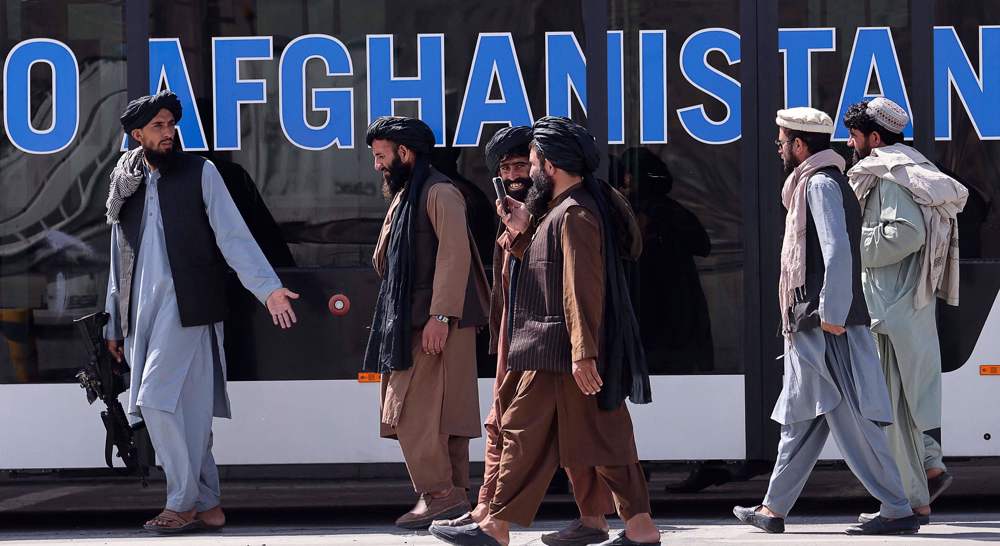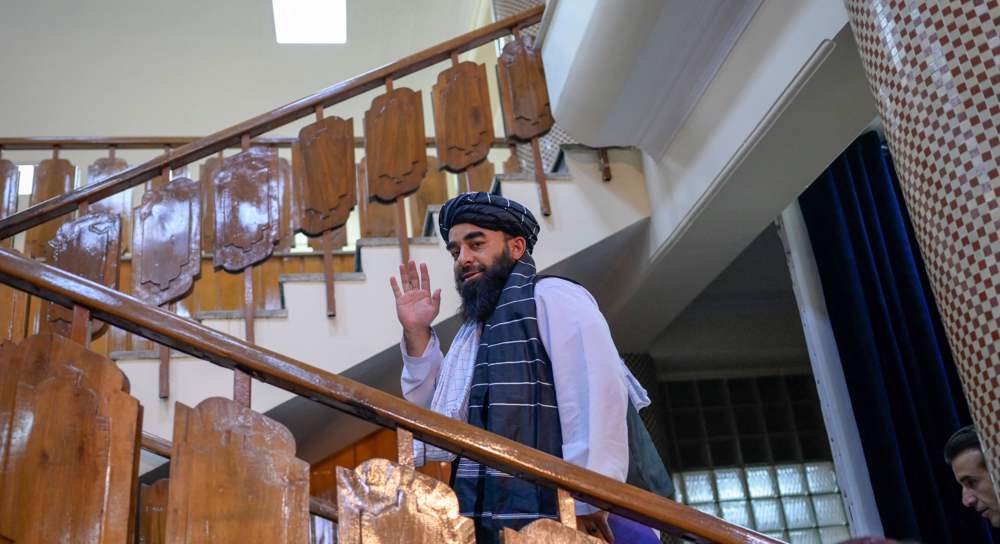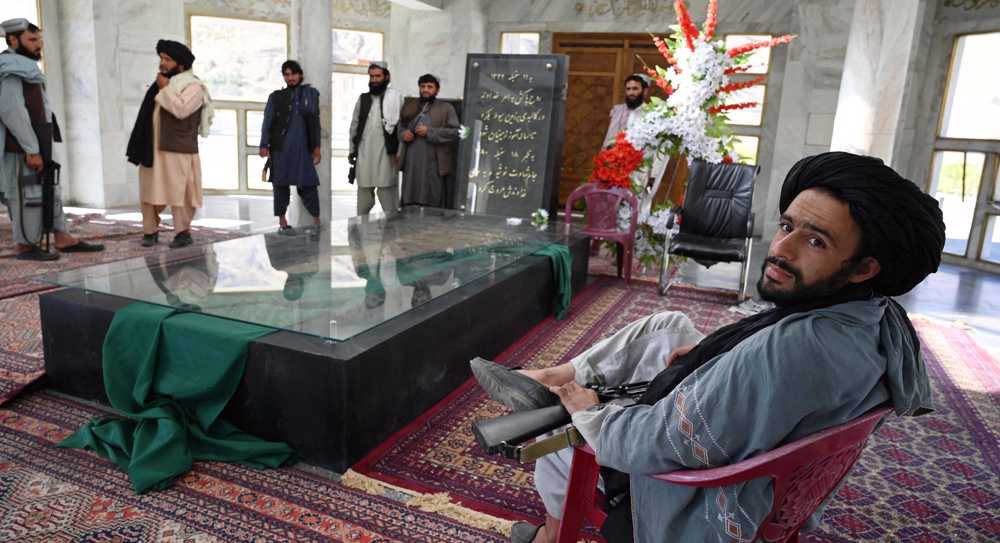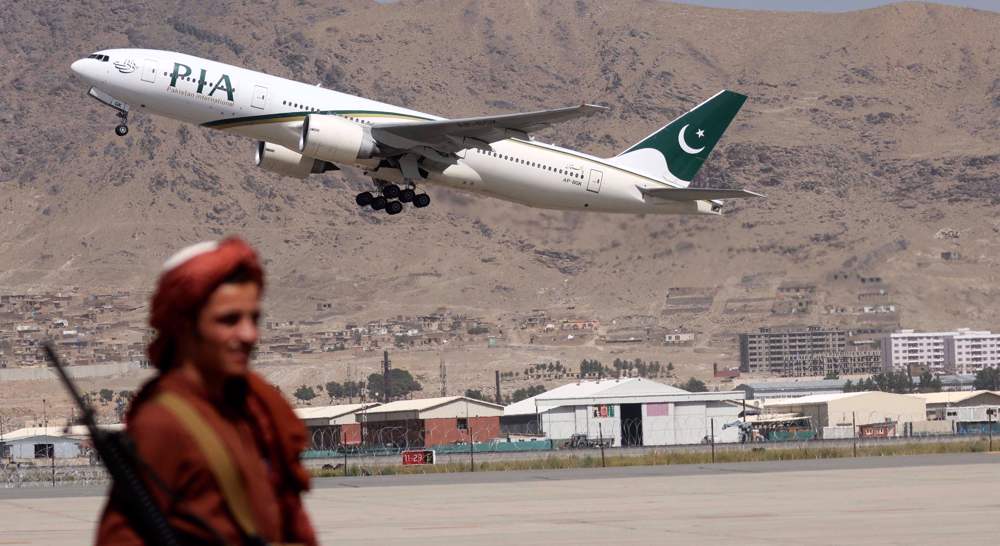Story by Hossein Jelveh and Marziyeh Kaffash

Inside the perimeter at Hamid Karzai International Airport, the US troops were in the middle of an act of completion of their own: taking out the last of the US and coalition forces and personnel, as well as thousands of departing Afghans, most of them former collaborators with the Americans who now feared reprisals by their enemy re-empowered.
The checking of documents by the Taliban outside the airport prefigured what is destined to become the group’s new undertaking: enforcing administration. With the foreign forces gone, and no meaningful domestic resistance in place, the religious students-turned-guerrilla fighters are left with no more fighting to do. If it weren’t the Taliban, any future combat would have been political. Nevertheless, given the extraordinarily calm situation after the takeover, it seems that even they can rest their AK47s against the bullet-pockmarked walls for the time being.

There is only one issue: the Taliban have known little other than war. Both by design and default, they have carried a militant dimension that has outweighed their every other aspect since they first emerged in 1994. They took up arms that year with a determination to enforce their interpretation of Islamic rule, and even though they declared an Islamic Emirate in Afghanistan two years later and ruled most of the country until the US-led invasion in 2001, their years in power provided little exercise in governance: domestic rule was marked by retrograde brutality, and there was little foreign contact. The coming of the US war also soon marked the start of another era of fighting for the Taliban.
Still, they did have a political flank, even if only ancillary until recently. The militants established a political office in Doha, Qatar in 2013 to represent them in a context that was not defined solely by war. Its work bore fruit for the group when in 2020 representatives from the office reached a deal with the United States that secured the departure of all foreign forces from Afghanistan.
But that has been the extent of visible political behavior by the Taliban. Two spokespeople for the group, Zabihullah Mujahid and Suhail Shaheen, have been frequently holding press conferences and appearing on the media since the announcement of a caretaker Taliban government on September 7, but, apart from assurances of good governance, they have provided little information about how the interim government plans to feasibly hold the war-wracked country of 38 million up and running. Besides, the top posts have gone to the old guard, the prominent figures of the previous Taliban regime. (Even Mr. Mujahid and Mr. Shaheen, who are relatively younger Taliban figures, have received high-level assignments in the government; the former has been named deputy minister of information and culture, and the latter ambassador to the United Nations.)

Pir-Mohammad Mullazai, an expert on the Indian Subcontinent politics, told Press TV’s website that the Taliban do not have the necessary skills to run a bureaucratic system.
“The Taliban are in fact faqihs (Islamic theologians), their expertise is in Sunni fiqh, and a fiqh that is a certain interpretation of Islam for that matter and not one that others would approve of. Therefore, the running of state affairs will certainly fall to the bureaucrats and technocrats. The Taliban are more or less prepared to put technocrats at the top of the bureaucratic system and govern the country themselves at the top of the political system,” Mr. Mullazai said.
What will happen to the hundreds of thousands of rank-and-file Taliban fighters, who do not have much theological education? Mr. Mullazai said many of them, Pashtun villagers who joined the group to earn a living in the absence of work, would gradually return to their previous life. A smaller group of the fighters, who are more skilled in combat, will likely go on to form a future Taliban army or join police and other security forces, he said.
Yet another group of the fighters is non-Pashtun foreigners, who would now with the end of the war like to return to their home countries. “The Taliban look as if they would give space to the [foreign] forces to travel to Central Asia, Chechnya, China’s Xinjiang, or even to Iran,” Mr. Mullazai said.
Some reports from inside of Afghanistan indicate that local Taliban commanders have been assigned to mid-level posts such as police chiefs, etc.
A spokesman for the Taliban governor of Panjshir, Nasrallah Malikzada, told Press TV’s website that “skilled workers” would be employed, including potentially some who worked under the previous Western-aligned government.
But there are few signs of a concerted effort to build a bureaucracy of skilled operatives from the bottom up, comprising not fighters but people with actual expertise in day-to-day administration. And the current Taliban government has already been criticized for practices that seem to have been taken straight out of the former Taliban regime’s rulebook, including in the treatment of women. Interim Prime Minister Mullah Mohammad Hassan Akhund, and his deputy, the former head of the Doha office, Mullah Abdul Ghani Baradar, were unavailable for interviews for this article.
Still, some believe the Taliban have changed.
“I think there is a marked difference in the make-up and behavior of the Taliban in 2021 from the one we knew during their first government,” Asif Durrani, a former deputy head of Pakistan’s mission to Afghanistan and later ambassador to Iran and the United Arab Emirates, told Press TV’s website. “If you see today’s Kabul, the people have an everyday life. Educational institutions are open, although the Taliban have enforced separate seating arrangements for male and female students. However, it is an improvement compared to the last tenure of the Taliban when they were totally against women’s education, especially in colleges and universities.”
On Monday (September 27), the Taliban-appointed chancellor for Kabul University, Mohammad Ashraf Ghairat, barred women from attending the educational center.
Folks!
— Mohammad Ashraf Ghairat محمد اشرف غیرت (@MAshrafGhairat) September 27, 2021
I give you my words as the chancellor of Kabul University:
as long as real Islamic environment is not provided for all, women will not be allowed to come to universities or work. Islam first.
A deal, and a conquest
The takeover of Afghanistan by the militants and the foreign withdrawal, messy and bloody as they were, had been made possible by the deal signed between the Taliban and the United States in February 2020. Under the deal, the United States began withdrawing its and allied forces from Afghanistan in a process that was supposed to be completed by May 1 this year. US President Joe Biden, who took over in January 2021, generally endorsed that agreement but set the withdrawal date back until September. The Taliban, who until then faced major US airstrikes if they advanced too fast, accelerated their offensives, citing the breach of the agreement’s withdrawal completion date. The US military did not escalate, instead focusing on the pullout.
What would have been a bastion of resistance to the advancing Taliban, the famed Panjshir Valley, was uncharacteristically acquiescent earlier this month. Fighting tooth and nail, Panjshir-based forces had earned a reputation of invincibility by successfully keeping the mountainous valley under their control during the Soviet invasion (starting in 1979), the civil war that ensued the Soviet pullout, and the Taliban’s previous rule in the late 1990s. History did not repeat itself in 2021 though.
Following their lightning-fast takeover of the capital, the Taliban marched on Panjshir, situated near the Hindu Kush mountain range and home to over 100,000 people, including the country’s largest concentration of ethnic Tajiks. The resistance fighters, led by Ahmad Massoud, son of the legendary anti-Soviet commander, the late Ahmad Shah Massoud, fought briefly and unsuccessfully. The last pocket of armed opposition fell to the Taliban in only three weeks.
The opposition fighters have vowed to fight on. And there are reports of scattered fighting. But their rugged stronghold is largely deserted now, with only elderly men and livestock remaining in many villages, according to reports.

Conflict of interest?
A major hurdle faced by the Taliban government is activity by terrorist groups such as Daesh and al-Qaeda. The Taliban have professed publicly that they will not allow Afghan soil to be used against any other country. They have made such a pledge specifically to the United States in writing. But the prospect of containing international terrorist groups from growing in a war-riddled country remains unclear at best.
Daesh has already struck Afghanistan at least once since the Taliban takeover. As the Americans were scrambling to leave, Hamid Karzai International Airport turned into a bloodbath when a Daesh assailant detonated explosives on himself near a main gate, followed by gunfire from multiple other attackers. At least 169 civilians and 13 US service members were killed in the terror attack, which was claimed by Daesh’s faction in Afghanistan soon afterwards.
In an apparent sign of disdain for the Taliban, Daesh last month attempted to play down the Taliban’s rise to power and claimed Afghanistan had simply been handed over to the group by the American pullout. The Takfiri outfit alleged that the Taliban operated as a US proxy, terming the group a “Mullah Bradley project.”
Last Tuesday, Mr. Mujahid, the Taliban spokesperson, flatly dismissed the presence of Daesh or al-Qaeda militants in Afghanistan. “We do not see anyone in Afghanistan who has anything to do with al-Qaeda,” he said.
‘The situation has changed:’ The prospects of foreign recognition
But domestic rule is only one side of the coin. The Taliban would have good reason to be concerned about foreign recognition as well. The former Taliban regime (1996 to 2001) was recognized only by three governments, those of Saudi Arabia, the United Arab Emirates, and Pakistan. And the group is designated a “terrorist organization” by Russia, a major neighbor to the north. With the exception of Pakistan, none of Afghanistan’s immediate neighbors have ever supported the Taliban.

So far, no country has recognized the caretaker Taliban government. Many countries have expressed concern that the government is not inclusive. On September 22, the five permanent members of the United Nations Security Council — Russia and China included — agreed that the Taliban government should include people from other Afghan ethnicities and groups as well.
In a speech to the United Nations General Assembly on September 21, President Ebrahim Raeisi of Iran, another neighbor of Afghanistan, had an implicit message for the Taliban. “If an inclusive government having an effective participation of all ethnicities shouldn’t emerge to run Afghanistan, security will not be restored to the country. And like occupation, paternalism is also doomed to failure,” President Raeisi said.
Also last Tuesday, the Pakistani prime minister, Imran Khan, conditioned the official recognition of the Taliban on “how they progress.” But on Friday (September 24), during a speech to the United Nations General Assembly, he urged the world to work with the Taliban government. “There is only one way to go. We must strengthen and stabilize the current government, for the sake of the people of Afghanistan,” Mr. Khan said.
Mr. Durrani, the former Pakistani ambassador, said international recognition would be a challenge for the Taliban. “Already the US has made human rights, including women’s rights, conditional for the recognition of the Taliban regime.” But, like Mr. Khan, he was upbeat.
“The situation has changed now. It could be said that the immediate neighbors of Afghanistan may consider recognizing the Taliban regime if the latter is flexible enough towards an inclusive government by according adequate representation to all the ethnic and religious groups,” he said.
Mr. Mullazai said the Taliban were effectively being established as a reality. Pakistan is already working hard to enable the recognition of the Taliban government within the framework of, say, the Organization of Islamic Cooperation (OIC). However, in the United States and Europe, he said, ruling parties were being cautious about recognizing the Taliban over concerns about negative advertisement by opposition parties. China and Russia, on the other hand, have more economic interests in Afghanistan and would be ready to offer swifter recognition.
On Sunday, Mr. Mujahid said that representatives from a number of unknown countries had visited Afghanistan, a hint that they would recognize the Taliban government soon.

No comments:
Post a Comment